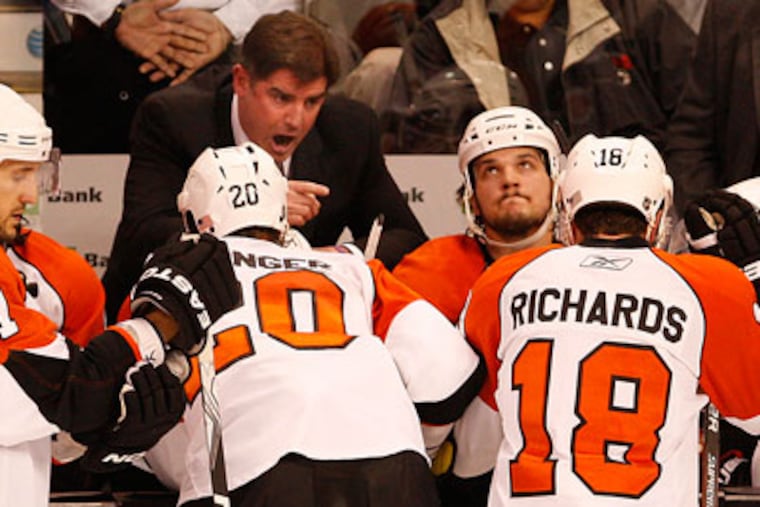Online Extra: Laviolette and Flyers a perfect fit

During the Flyers playoff run, Daily News columnist Rich Hofmann will be providing additional insight and analysis to philly.com readers with columns posted at midday. Here is today's installment:
Listening to Flyers coach Peter Laviolette grump after the game on Tuesday night, another shutout victory over the Montreal Canadiens, about how badly his team played in the first period, and how goaltender Michael Leighton had to bail them out, and how "you don't want to roll those dice too many times," it was just about exactly right, which isn't surprising. It is hard to recall Laviolette hitting a bad note since he got here.
Temperamentally, stylistically and tactically, he is proving to be the perfect Philadelphia Flyers coach.
Laviolette is everything this franchise (and its fans) have always wanted in a coach. He is blunt when he needs to be and, from the chairman on down to the guy sitting in the last row of the second level, they love when a coach is like that. A coach has never sold a ticket in this town with his personality, not in any sport, but Laviolette clearly meshes with the whole Flyers mindset.
They love the timeouts, too. I might get more email about the timeouts than anything, about Laviolette's uncanny ability to make a tangible difference with 30 seconds of conversation. Some of them have been memorable scream-fests, and people really enjoy being allowed that peek into a coach's motivational skill set. Then there was the one in Game 7 against Boston -- down 3-0, reeling, the historic comeback dream about to die, and there was Laviolette, not screaming, not lecturing, not insisting, but calming instead.
He has played about every club in the bag this season, but we had not really seen that one -- mostly because we had never seen the team in a spot like that. You couldn't read Laviolette's lips the whole time, but you could see a single word that he kept repeating: "one." As in, "Let's just get one goal."
We all know what happened. And anyone who thinks that the re-focusing and reassuring -- in the din of TD Garden, on the verge of being run out of the building -- wasn't a significant element in what followed, well, you haven't been watching all year.
But even more than the coaching personality, it is the tactics that matter most of all. Again, for this town, this team, this time, Laviolette is such a great fit. The truth is, the club hierarchy -- led by Bob Clarke for so many years as general manager, now by Paul Holmgren -- has quietly craved a coach who is completely dedicated to an aggressive forechecking style. Now, they finally have one.
When you start talking about this kind of thing, you inevitably end up discussing the organizational DNA -- that is, that the default position for the Flyers has always been a shot in the mouth. In bad times, it is painted as an unhealthy attempt to transfer a storied past into the present. In better times, it is seen as something so rare in this century, a franchise with a recognizable identity. Over the years, both statements have been true.
The purpose here is not to extend that discussion. It is simply to recognize the reality that the Flyers, from top to bottom, are not really happy unless the team is defining itself physically.
Now they have a coach who believes the same thing and they play at a time in NHL history where you can measure the risks and rewards and make the case that forechecking makes sense again.
Before the rule changes took out the red line and so much of the obstruction, you could make the argument that pushing the physical tempo was not the answer, that middle-of-the-ice structure mattered the most of all and that counter-attacking out of that structure was the way to go. Plenty of successful teams still play that way; witness the Canadiens.
The Flyers are different, though. They have enough speed and skill to play a skilled kind of game but they are very happy to bang with two forecheckers and a third man high at the top of the circles. Call it a left-wing lock, call it whatever you want, the essence is the commitment of two forecheckers instead of one.
But it is more than a tactic -- it is a way of hockey life. When a signature element of your playing style is to attack aggressively on the forecheck, it creates an aggressive tone in everything you do. Sometimes, that simply means hitting. More times, as in this series against the Canadiens, it means a willingness to aggressively stake out a position in one of the painful areas in front of the net and only give ground grudgingly.
That is the difference in this series. The Canadiens have done a lot more good things than a combined deficit of 9-0 in the first two games would seem to indicate, but they have not come close to matching the Flyers in staking out those positions in the painful areas. Of the nine Flyers goals, six or seven of them were the result either of a screen of Canadiens goaltender Jaroslav Halak or the act of a Flyers player refusing to give ground in front and taking a whack at an available rebound.
That is what Laviolette has brought, an aggressive playing style that begat an aggressive mindset. It is why they are winning. It is why he fits so well with what the Flyers are, and what they have always liked to think they are.